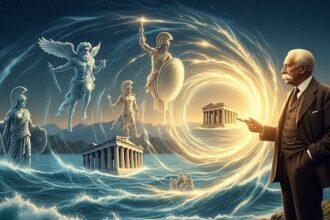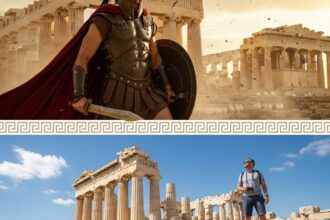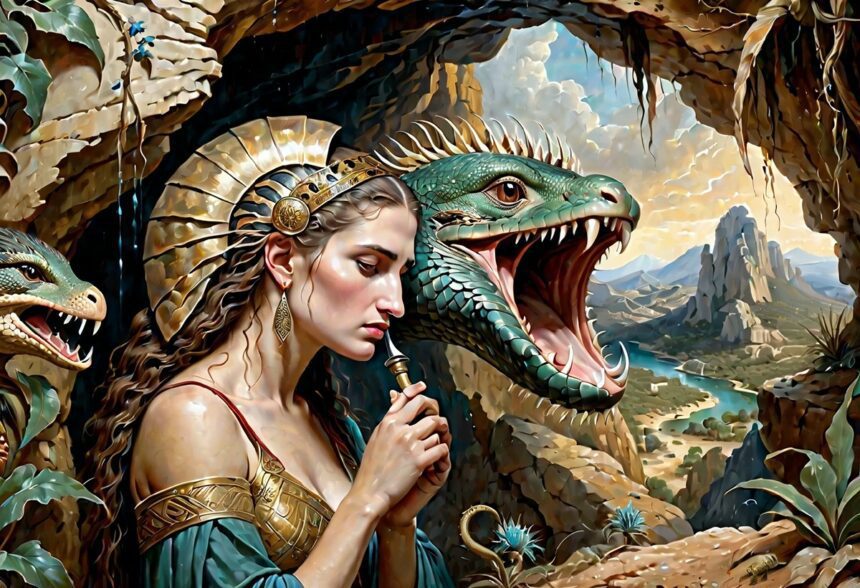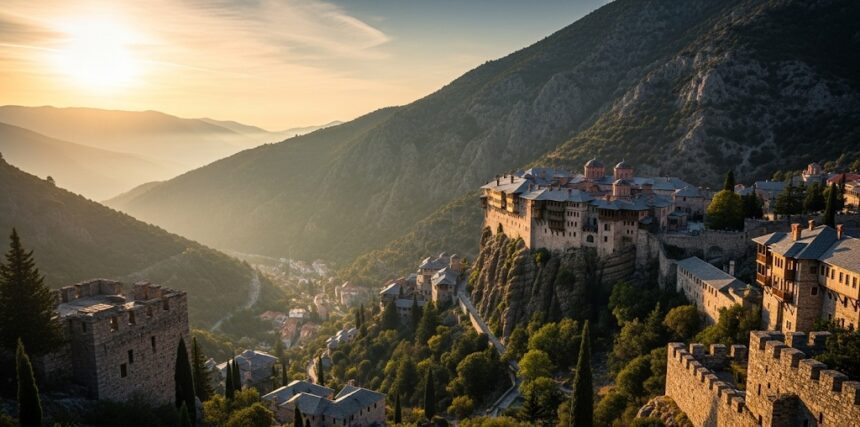The ancient Greeks crafted an intricate mosaic of legends that shaped their understanding of life, death, and the divine. Among these captivating tales is the concept of the Champs-Élysées and the Islands of the Blessed, paradisiacal realms reserved for a select few favored by the gods. Unlike the shadowy depths of Hades, where most souls languished in a bleak afterlife, these mythical locales offered eternal bliss, bathed in perpetual sunlight and free from the burdens of mortal existence.
The Mythical Appeal of the Champs-Élysées and Islands of the Blessed
In ancient Greek mythology, the Champs-Élysées (often spelled Elysian Fields) and the Islands of the Blessed represented idyllic havens where the fortunate few—heroes, demigods, and those favored by the divine—could escape the grim fate of death in Hades. These realms were vivid expressions of the Greek longing for transcendence and eternal joy. Unlike the dark, sunless underworld ruled by Hades, where souls existed as shadows, the Champs-Élysées and Islands of the Blessed were bathed in eternal light, offering a carefree existence akin to that of the gods themselves.
The term Islands of the Blessed likely originated as “the islands of the gods,” with the adjective “blessed” referring to the divine inhabitants. Over time, however, these realms became associated with mortals granted the rare privilege of divine favor. Located at the edges of the world, near the mythical Ocean River, these paradises were geographically and spiritually distant from the mortal realm, accessible only to those chosen by the gods.
A Paradise for the Chosen Few
The Champs-Élysées and Islands of the Blessed were not open to all. Entry was reserved for those with divine connections or extraordinary deeds. In Homer’s Odyssey, the sea elder Proteus informs Menelaus, husband of Helen and son-in-law of Zeus, that he would not die an ordinary death but would instead be transported to the Champs-Élysées. This divine meadow, described as a place where “people live carefree, without being bothered by snow, rain, or heavy winter,” was ruled by the blond Rhadamanthus, a figure synonymous with justice and divine favor.
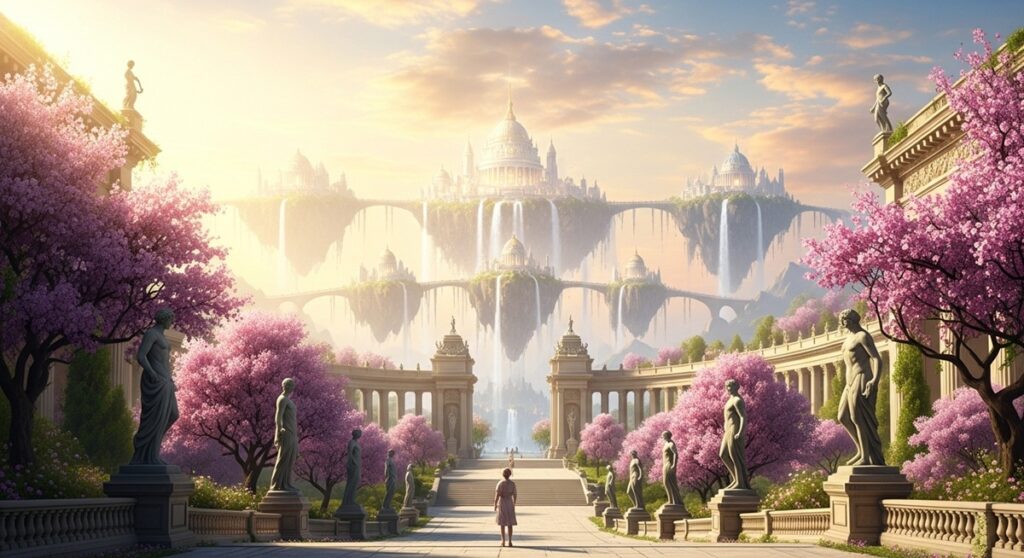
The promise of eternal bliss in these realms was tied to divine intervention. Heroes like Achilles and Memnon, revived by their divine mothers, were transported to paradises like the White Island or the Islands of the Blessed, where they lived neither among mortals nor gods but in a liminal wonderland. This selective immortality underscored a key theme in Greek mythology: the gods’ power to elevate their chosen beyond the mortal coil.
The Role of Divine Favor in Accessing the Champs-Élysées
The criteria for entry into the Champs-Élysées or Islands of the Blessed were not rooted in moral virtue but in divine kinship or favor. Menelaus, for instance, earned his place not through heroic deeds but because of his marriage to Helen, making him a relative of Zeus. Similarly, Rhadamanthus, a permanent resident of the Champs-Élysées, owed his eternal bliss to his divine lineage as a son of Zeus. This pattern suggests that proximity to the gods—through blood or favor—was the primary qualification for entry.
In Hesiod’s Works and Days, the Heroic Age—a race of demigods who fought at Troy and Thebes—is described as superior to the preceding Bronze Age. Some of these heroes, spared the fate of death, were transported to the Islands of the Blessed, where they lived in eternal happiness. This narrative reinforces the idea that divine favor, rather than moral righteousness, determined one’s posthumous destiny in these paradises.
The Poetic Origins of the Myth
The concept of the Champs-Élysées and Islands of the Blessed likely emerged from poetic imagination rather than religious doctrine. Scholars like Erwin Rohde argue that these myths were born from a “free poetic imagination” rather than earthly worship. The idyllic scenes of carefree life in a distant paradise fulfilled a human yearning for an escape from mortality’s inevitability. Greek poets, from Homer to Hesiod, crafted these narratives to elevate the status of their heroes, offering them a divine reprieve from the bleakness of Hades.
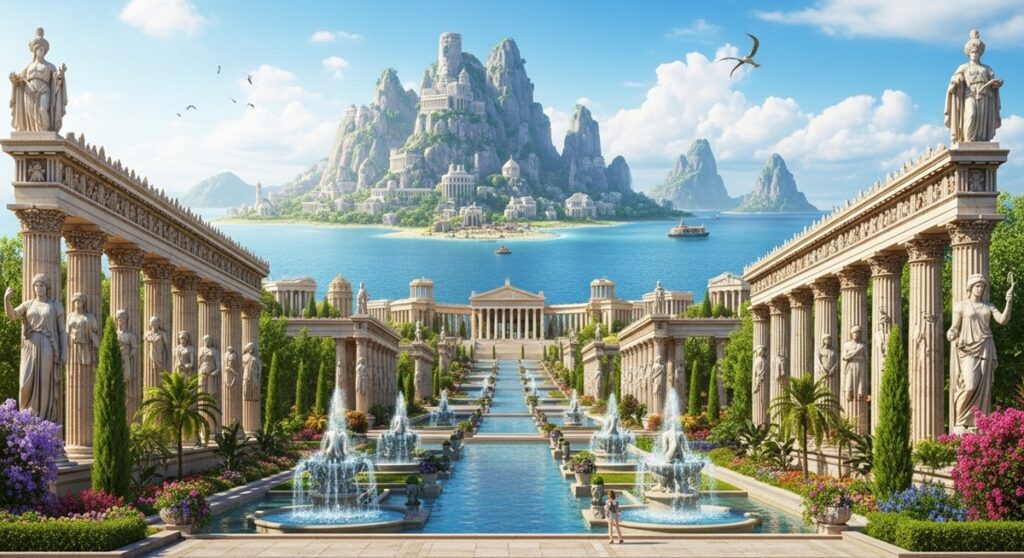
In later traditions, as recorded by Pausanias, regions like Sparta and Laconia venerated heroes such as Menelaus, Helen, and Achilles in local cults. However, these practices were likely inspired by the myths themselves rather than their cause. The Homeric epics, with their vivid depictions of divine favor and paradisiacal realms, profoundly influenced later Methodist poetry, which expanded the accessibility of these divine destinations.
The Evolution of the Champs-Élysées in Later Traditions
As Greek society evolved, so too did the conception of the Champs-Élysées and Islands of the Blessed. In the Methodist era, influenced by secret cults like Orphism, these paradises became more inclusive. No longer reserved exclusively for heroes with divine lineage, the Champs-Élysées began to welcome the souls of the righteous and those initiated into mystery cults. This shift marked a significant departure from the Homeric view, where only the gods’ chosen could access these realms.
The Influence of Orphism and Mystery Cults
Orphism and other mystery cults introduced the idea of restorative justice, where the afterlife rewarded the virtuous and punished the wicked. In this new framework, the Champs-Élysées and Islands of the Blessed became destinations for those who lived piously or were initiated into sacred rites. Pindar, in his 2nd Olympian (476 B.C.), describes a triadic afterlife: the righteous enjoy a joyful existence in the Underworld, the wicked suffer, and those who pass three tests ascend to the Islands of the Blessed.
This transformation reflected broader societal changes. As Aristophanes illustrates in his comedy Frogs, the afterlife began to reflect moral and civic values. Punishments once reserved for the uninitiated were extended to those guilty of moral or political transgressions, such as oath-breaking or violating hospitality laws. The Champs-Élysées, once a surface paradise, were reimagined as an subterranean realm accessible only to dematerialized souls.
A Paradise of Eternal Spring
The Champs-Élysées and Islands of the Blessed were depicted as paradises of eternal spring, free from the harshness of mortal climates. Lucian, in his satirical True History, paints a vivid picture of the Islands of the Blessed: a land of emerald walls, pearl-paved streets, and rivers flowing with milk, honey, and wine. The inhabitants, untouched by aging, lived in a state of eternal twilight, surrounded by fertile fields and self-filling wine glasses. While Lucian’s account is deliberately exaggerated, it captures the Greek imagination’s fascination with an idyllic afterlife.

Virgil, in his Aeneid, echoes these descriptions, portraying the Champs-Élysées as a lush meadow where Aeneas encounters the blessed souls. Byzantine writers like Timarion and Mazaris further embellished these depictions, drawing heavily on Greek traditions to craft their own satirical visions of paradise.
The Cultural and Philosophical Significance
The Champs-Élysées and Islands of the Blessed reflected the ancient Greeks’ complex views on mortality, divinity, and justice. In the Homeric tradition, the afterlife offered little hope, with Hades serving as a realm of “incessant, pointless flapping.” The Champs-Élysées, by contrast, provided an optimistic counterpoint, a vision of eternal joy reserved for the divine elite.
As Greek thought evolved, particularly under the influence of Plato and the mystery cults, the afterlife became a space for moral reckoning. Plato introduced the concept of judges like Minos, Rhadamanthus, and Aeacus, who evaluated souls based on their earthly deeds. This marked a shift toward a more structured and just afterlife, contrasting with the Homeric view of divine caprice.
The Role of Kinship and Privilege
The emphasis on divine kinship in accessing the Champs-Élysées highlights the aristocratic underpinnings of early Greek mythology. As Panagis Lekatsas notes, the pre-Hellenic tradition of god-kings influenced Homer’s portrayal of Achaean kings as divinely favored. The Champs-Élysées, later renamed the Islands of the Blessed under the rule of Saturn, reinforced this connection between divine lineage and eternal reward.

This exclusivity gradually gave way to a more democratic vision. By the 5th century B.C., poets and cult practitioners imagined a broader range of individuals—those who lived virtuously or were initiated into mysteries—gaining access to these paradises. This shift mirrored the growing influence of ethical and spiritual considerations in Greek society.
A Timeless Vision of Paradise
The Champs-Élysées and Islands of the Blessed remain enduring symbols of humanity’s quest for transcendence. From their origins in Homeric poetry as exclusive havens for the divinely favored to their later transformation into accessible paradises for the righteous, these mythical realms reflect the evolving aspirations of ancient Greek culture. Whether described as sunlit meadows or emerald-encrusted islands, they embody the universal dream of a life free from suffering, bathed in eternal light.
Through the works of Homer, Hesiod, Pindar, and Lucian, the Champs-Élysées and Islands of the Blessed have left an indelible mark on Western imagination, inspiring visions of paradise that resonate to this day. As we explore these myths, we glimpse the ancient Greeks’ profound desire to transcend mortality and find a place among the divine.








